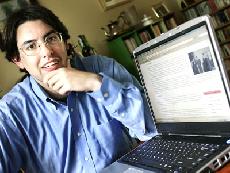
Simon Pulsifer: “the king of Wikipedia”
“He lives at home and doesn’t have a girlfriend.”
(photo: Bill Grimshaw/The Globe and Mail)
I just came across this story in The Toronto Globe and Mail about a young man from Ottawa by the name of Simon Pulsifer who, under the moniker SimonP, is Wikipedia’s most prolific contributor: “with 78,000 entries edited and 2,000 to 3,000 new articles to his name. He can’t remember the exact number.”
Pulsifer is also the subject of an article in Wikipedia, which, like many of the vanity stubs devoted to the encyclopedia’s editors, was nominated for deletion, only to be voted a keeper after some discussion. Justin Hall, a colleague of ours at USC, often cited as the first blogger, and a distinguished Wikipedian in his own right, offered the following in defense of the Pulsifer page:
As Wikipedia grows in importance and global reach, the most passionate participants in this collective editing experiment become important global intellectuals. Simon Pulsifer is one of the first public Wikipedians – with a great number of articles, a passion for editing under-developed subjects, and a strong sense of the mission of Wikipedia. He might not care to have an article about him here, but already mainstream media outlets (a Canadian newspaper) and online news sites (digg.com) have saluted his work. That attention and importance is only likely to increase. Let’s keep this article because Simon Pulsifer has already reached a greater number of people than many of the “historic” individuals described on Wikipedia.
Both Pulsifer and Hall are members of what could be considered the Wikipedia elite, the “notable Wikipedians“. Many of these probably deserve a good share of the credit for Wikipedia’s success. Now, though, I’m more interested in how Wikipedia’s corps of editors might gradually expand to include a greater slice of the public: teacher, students, and people from all walks of life.
Zealous Wikipedia hobbyists like Pulsifer, god love ’em, will hopefully, over time, be considered the exceptions that prove the general rule of participation: editing as a more modest pursuit that one builds into one’s intellectual life and lifelong learning regimen. If enough people begin to take part in this way, Wikipedia could become more diverse, more exhaustive, and more accurate than it already is. The Pulsifers and Halls might end up being its governors, its civil servants, its politicians. Of course, it is the process that is most important: the kind of civic participation and engagement over points of dissent that collaborating on Wikipedia entails. Bob explained this eloquently last week. Or, as Pulsifer describes it:
You write an article and you think you’ve made it as good as it can be and then you put it out there for everyone to see and edit. And within just a few minutes, you have started a dialogue over how best to represent a subject.
